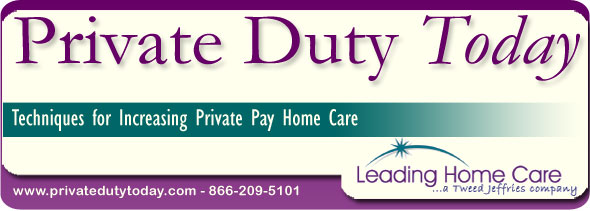Today's post is about Networking for Success. It comes from the Private Duty Today newsletter published by Stephen Tweed's Leading Home Care organization. The article was written by Stephen Tweed and can be found at www.privatedutytoday.com. In Ankota, nobody networks better than our Chief Operating Officer (COO) Marc Ottinger. Marc's personal playbook includes lots of the points raised below. In other words, they work!
Today newsletter published by Stephen Tweed's Leading Home Care organization. The article was written by Stephen Tweed and can be found at www.privatedutytoday.com. In Ankota, nobody networks better than our Chief Operating Officer (COO) Marc Ottinger. Marc's personal playbook includes lots of the points raised below. In other words, they work!
Networking 101 - Ten Steps To Better Referral Relationships
by Stephen Tweed
In their book, Is Your NET Working: A complete guide to building contacts and career visibility, Ann Boe and Betty B. Youngs defined networking as:
"An organized method of making links from people you know to people they know, gaining and using an ever expanding base of contacts."
gaining and using an ever expanding base of contacts."
My friend and colleague, the late Cavett Robert, founder of The National Speakers Association was fond of saying:
"We must circulate if we expect to percolate. We must make
contacts if we expect to make contracts."
The 2010 Home Care & Hospice Sales & Marketing Survey conducted by Leading Home Care reinforced the importance of networking as a business building tool for private duty home care. Again this year, networking, making sales calls to referral sources, and your web site are the top three techniques for attracting referrals and inquiries that turn into admissions.
We define Networking as...
"the systematic process of regularly keeping in touch with people you already know, and being introduced to people that you do not already know, for the purpose of developing relationships that can turn into referrals."
There are several key phrases:
- People you do not already know
- Developing relationships
- Turn into referrals
When you are at a networking event, here are ten tips to turn new acquaintances into referral relationships:
- Ask great questions. Questions are the most powerful tool in your networking tool kit.
- Get the name right the first time. You build relationships by learning and using the other person's name.
- Listen carefully. Many people in networking situations don't listen. They wait to talk. Becoming a better listener will pay big dividends.
- Give your undivided attention. How often have you been in a conversation with a person who is constantly looking over your shoulder to see if someone more important is available? Focus on the person you are speaking with.
- Give without expectation of getting. The most successful networkers participate in community events and give their time, talent, and treasures without the expectation of getting something in return.
- Become an introducer. Get in the habit of introducing other participants in the networking event to people you know. Remember, the purpose is to get connected.
- Fish where the big fish live. Spend your time networking at those events that have the highest potential for meeting new referral sources.
- Define whose network includes you. While you want to meet new referral sources, who wants to meet you?
- Be sure to follow up. Once leaving the event, have a system to follow up, get back in touch, and schedule a sales calls if appropriate.
- Get long results with short notes. Writing a short, personal, hand-written note after meeting someone new is a very powerful way to make a lasting impression. It's too easy to send an email, everyone does that. Be different.
Measure the results of your networking.
Keep track of the people you meet at networking events. Add them to your database. Follow up with a personal sales call. Then track the results you get. It will be impressive to see how many new referrals can come from a small number of new referral sources when you master the art of networking.
In his book, The Relationship Edge in Business, Jerry Acuff says,
"The key words are consciously, systematically, and routinely. Building business relationships that last is a skill that virtually anyone can learn. It requires a process you can master."
Ankota provides software to improve the delivery of care outside the hospital. Today Ankota services home health, private duty care, DME Delivery, RT, Physical Therapy and Home Infusion organizations, and is interested in helping to efficiently manage other forms of care. To learn more, please visit www.ankota.com or contact Ankota





Your Comments :